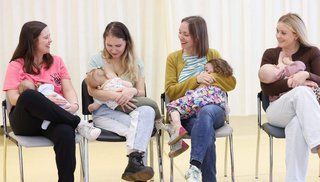
The HSE is continuing to highlight the benefits of holding your baby close through safe skin-to-skin contact in supporting feeding, bonding and recovery after birth. The practice of placing a baby directly on their mother’s chest is a key moment immediately after birth. This helps the baby to adjust to the outside world and stimulates their brain. It helps to pass on good bacteria (microbiome) from mother to baby, supporting the development of a healthy gut.
Laura McHugh, HSE National Breastfeeding Coordinator, advises mothers to “do safe skin-to-skin contact as much as possible as your baby grows. It comforts your baby and makes them feel secure. Skin-to-skin contact helps you develop confidence in caring for and feeding your baby. It also helps improve your sleep and your baby’s.”
Research shows that the more skin-to-skin contact your baby experiences during their first year of life, the better the physical and mental health outcomes will be for your child, including into adulthood. Safe skin-to-skin is important for all babies, whether breastfed, and bottle-fed, or a mix of both.
According to the latest HSE data, 89% of mothers and babies had the opportunity to have skin-to-skin contact immediately after birth. All midwives are trained in supporting safe skin-to-skin contact. It is covered in antenatal classes for parents-to-be and the HSE’s mychild.ie website includes information on how to do it safely, including a video.
Breastfeeding rates continue to increase, with a rise from 60.3% in 2023 to 61.9% in 2024 at the first public health nurse (PHN) visit, and from 42% in 2023 to 44% in 2024 at the 3-month PHN check.
“There are now greater supports for parents to help them to start breastfeeding and to continue for longer, which is contributing to an upward trend in rates. These include additional infant feeding/lactation nurses, breastfeeding support groups, increased access to breast pumps where needed and breastfeeding breaks in the workplace.”
The HSE, in partnership with the National Perinatal Epidemiology Centre (NPEC), is also launching a new Infant Feeding Survey for parents to share feedback on their experiences of feeding support from maternity and community healthcare professionals during pregnancy and after birth. Clare Kennedy, HSE Baby Friendly Initiative Lead, explained that they “put the mother’s voice at the centre of developing care and services for infant feeding. This survey will be available online and will be used for local and national service improvement and planning.”
Skilled breastfeeding supports are available in all maternity units and hospitals and through local health services. Parents or parents-to-be can ask questions by email or live chat through the ‘Ask our breastfeeding expert’ service on mychild.ie. Over the last year, 2,250 questions have been answered online by HSE experts. Most common queries this year were about expressing breast milk, sore nipples, low milk production, phasing out breastfeeding and breastfeeding support groups.
There are now 225 free breastfeeding groups listed on mychild.ie.
Details of local breastfeeding support groups and ‘Ask our breastfeeding expert’ support service are available on mychild.ie/breastfeeding, as well as practical advice across a wide range of breastfeeding and other pregnancy, parenting and child health topics.
National Breastfeeding Week is a HSE-led event, marked in the first week of October each year.
The promotion of the benefits of breastfeeding underpins the stated priorities in the HSE Corporate Plan in relation to the development of Healthy Communities with particular emphasis on increasing the rates of breastfeeding.